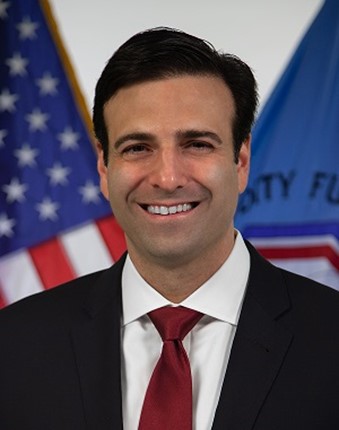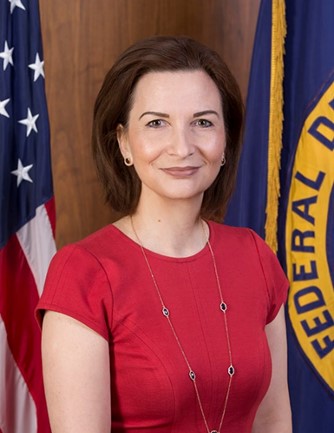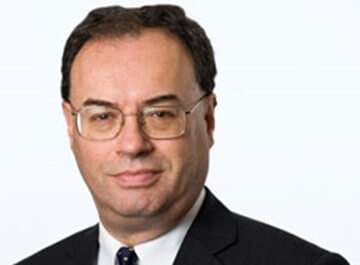Into his fourth month at the helm at the Commodity Futures Trading Commission, chairman Heath P. Tarbert is pushing the accelerator on the agency's technology and innovation. On October 10 he announced the appointment of fintech advocate and former Intuit regulatory affairs official Melissa Netram as director of LabCFTC. Two weeks later, Tarbert declared that the two-and-a-half-year-old innovation hub was becoming “its own operating office, reporting directly to the chairman.”
Elevated from the Office of General Counsel, where it had been reporting to general counsel Daniel J. Davis, LabCFTC will “solidify its position within the agency” as it continues on its mission of engaging with new technologies and serving as an in-house think tank, Tarbert said in remarks to CFTC's Fintech Forward conference on October 24. “Now it will take on an even bigger role here at the CFTC and be a critical link to innovators for years, and perhaps decades, to come,” Tarbert said, acknowledging earlier-stage contributions by his predecessor, J. Christopher Giancarlo, and previous LabCFTC director Daniel Gorfine.

“In its new capacity, LabCFTC will continue to be focused on innovation by serving as a point of entry for innovators interested in the CFTC's regulations, ensuring our employees stay current about the latest technology, and enhancing technology that could help CFTC processes, including enforcement and fighting market manipulation,” Tarbert added. “Our agency's vision is to be the global standard for sound derivatives regulation.”
Global Movement
The U.S. futures-market overseer is embracing and taking up a notch a technology-receptive strategy that has become common among financial regulators domestically and around the world. Underscoring that point, the CFTC, Federal Deposit Insurance Corp., Office of the Comptroller of the Currency (OCC) and Securities and Exchange Commission jointly announced October 24 their membership in the Global Financial Innovation Network (GFIN), bringing to 50 the number of agencies collaborating on innovation-related issues on a global scale.
As Cathie Armour, commissioner of the Australian Securities and Investments Commission (ASIC), a GFIN member, put it in an October 23 speech in Beijing, “Globally, regulators are starting to think about whether regulatory frameworks should be more than just open to technology solutions - perhaps the time has come when we should expect, and advocate for, new technologies and new approaches, particularly where outcomes have otherwise been suboptimal.”
Like ASIC, the U.K. Financial Conduct Authority (whose 2018 proposal led to the January 2019 launch of GFIN) and numerous others, each of the new U.S. GFIN members as well as the Consumer Financial Protection Bureau, which was already in the group, has a dedicated innovation office or hub of fintech and regtech activity. Many have also created so-called sandboxes as safe spaces for experimentation free of regulatory red tape.
Fintech Charter Setback
The OCC in 2015 launched an initiative that led the following year to publication of a “responsible innovation” framework and the formation of its Office of Innovation. The framework addressed five areas, chief innovation officer Beth Knickerbocker recounted in June 2019 congressional testimony: outreach and technical assistance; awareness and training; coordination and facilitation; research; and interagency collaboration.
One outgrowth was a special-purpose national charter for fintech ventures, which became available for applicants in 2018 but has been struck down by a federal court in New York. “The decision stops OCC's attempt to usurp state authority by establishing a federal fintech regulatory framework at the expense of consumers,” said a statement from Linda Lacewell, superintendent of the New York State Department of Financial Services, which challenged the federal fintech charter.
The SEC has a year-old Strategic Hub for Innovation and Financial Technology, or FinHub, led by Valerie Szczepanik, senior adviser for digital assets and innovation and associate director of the Division of Corporation Finance.

FDIC chairman Jelena McWilliams in an October 1 speech discussed plans for FDIC Tech Lab, or FDiTech, to “collaborate with community banks on how to deploy technology in delivery channels and back-office operations to better serve customers . . .
“It is our job as a regulatory agency to understand technology by engaging with innovators in banks and at fintechs and to provide sound guidance and technical assistance to banks that choose to deploy new technology,” McWilliams said, adding that a search was underway for a chief innovation officer. “My goal is not to replace the business judgment of banks, but to identify and eliminate unnecessary regulatory burdens that discourage innovation.”
Answering a Challenge
“Digital assets and other 21st century commodities are transforming our financial markets, so it is critical that regulators keep up with financial innovation,” CFTC chief Tarbert said in introducing Melissa Netram as LabCFTC director. “Bringing together regulators and innovators is essential for the responsible development of cutting-edge fintech products, and ultimately the long-term success of our economy. LabCFTC is the agency's answer to that challenge, and I look forward to Melissa's leadership. Her expertise and vision will help take our efforts to the next level.”
Netram was until recently director of global public policy and regulatory affairs for Silicon Valley-based Intuit. In that role, she led efforts to position Intuit to capitalize on fintech innovations as a founding member of the Financial Innovation Now coalition.
With a bachelor's degree from Villanova University and a law degree from the Catholic University of America Columbus School of Law, Netram began her career in financial services at the U.S. Treasury Department, with a rotation through the Office of the Comptroller of the Currency. She later joined McGraw-Hill Companies and then the Financial Services Roundtable (now Bank Policy Institute), where she worked extensively on the Dodd-Frank Act.
Netram is the second senior official among Tarbert's recruits with a legal and “new tech” background. In September, Dorothy DeWitt, who was most recently vice president and general counsel for business lines and markets at San Francisco-based cryptocurrency company Coinbase, was named director of CFTC's Division of Market Oversight.
Collaboration and Coordination
In his fintech conference remarks, Tarbert stressed the need for collaboration, which is a rationale for joining the Global Financial Innovation Network.
“The U.S. derivatives markets are a key part of the global financial system,” the chairman explained. “While the CFTC is the primary regulator of these markets, we can't do this work alone. We collaborate at the federal and state level as well as internationally. Coordinating with our international partners helps reduce systemic risk, avoid market fragmentation, protect customers, and promote basic international standards. It can also help us as regulators keep up with the rapid pace of technological change in our markets.”
He vowed that the CFTC on his watch will have a “strong commitment” to innovation, with an eye on emerging developments “from blockchain to digital assets to cybersecurity.” He endorsed a principles-based regulatory approach that “essentially means we set the destination but leave it to our registrants to find the best path to get there. This approach allows flexibility for our markets to take advantage of new technology and other advances. Yet it still retains fundamental regulatory mandates so everyone knows what is expected of them.”
CFTC released a primer on artificial intelligence that concludes: “Implemented responsibly, AI has great potential to enhance our markets.”
Tech for the Regulators

Tarbert added that “technology moves much faster than regulation - we need to set the parameters so innovation and technology can thrive responsibly. If we the regulator better understand the innovations in our markets, we can make sure we have the right mix of principles and rules to strike that balance. That's why coming together to discuss these issues like we are today is so important.”
Regulators' need to be up to speed came up in Financial Conduct Authority chief executive Andrew Bailey's October 24 speech at the Lord Mayor's City Banquet. After “name-checking” the agency's “FCA Innovate and our Sandbox and all the initiatives that go with it such as our TechSprints,” Bailey acknowledged “growing demands for stronger and faster intervention by public authorities like the FCA,” as well as “the big question of how we reconcile risk taking with investor protection in a world that has changed in important respects.
“We can point to very big achievements at the FCA in recent years . . . But part of the criticism we face is justified. We should improve our efficiency - which, again turning to the FCA, is why we want to make a major investment in data analytics to give our staff more effective tools to do the job.”
In Australia, Armour said that ASIC has issued challenges to regtech developers: “The first was to use natural language processing to identify misleading and deceptive promotional material. The second was to use machine learning technology to improve financial advice. Most recently, we had three voice analytics providers look to automate the monitoring of telephone sales for insurance . . . The series has proven to be a catalyst for the strengthening of dialogue between financial services firms and technology providers.”
Armour added: “Regtech also presents opportunities for financial regulators. We are certainly interested in using technology to facilitate our supervisory and enforcement processes. In some respects we are quite advanced. For a number of years we have conducted real-time surveillance of the Australian equities markets using a sophisticated surveillance system, and we started early on developing our capability to investigate misconduct in the dark web and other technology-enabled offending. In other ways, we still have more to do to better harness technology and data advantages.”